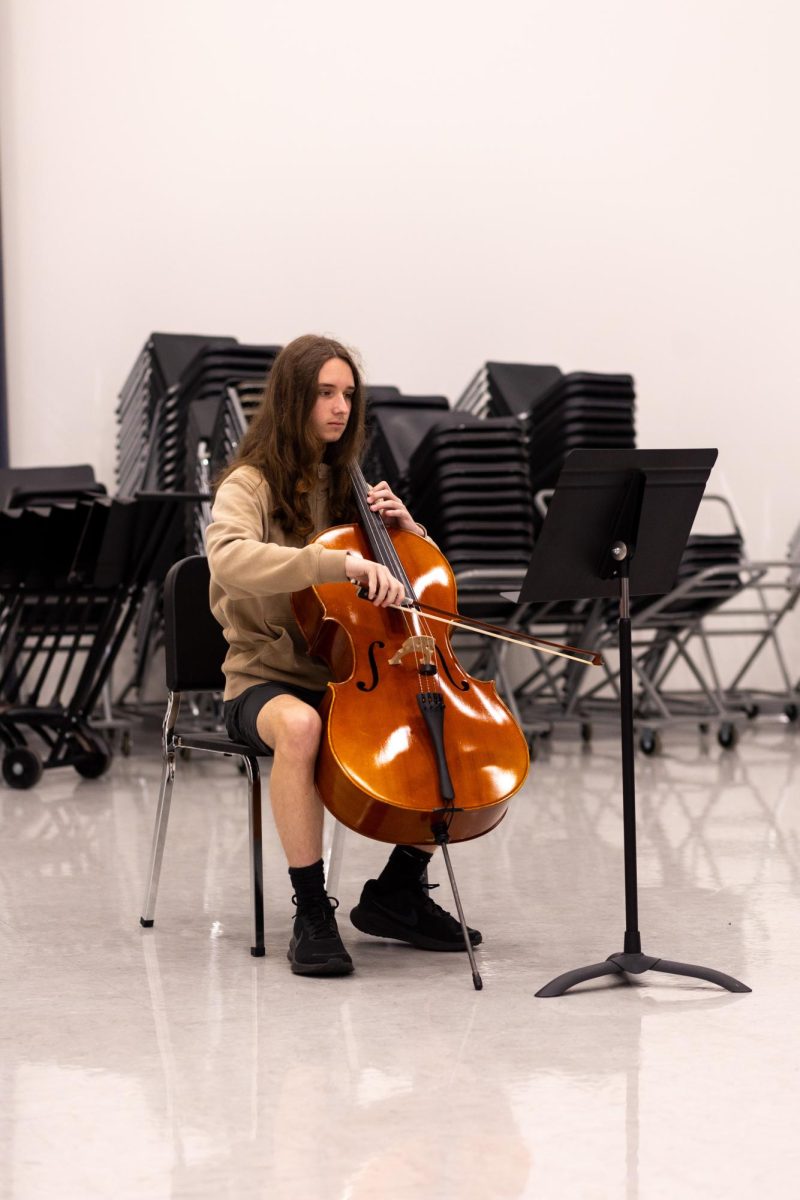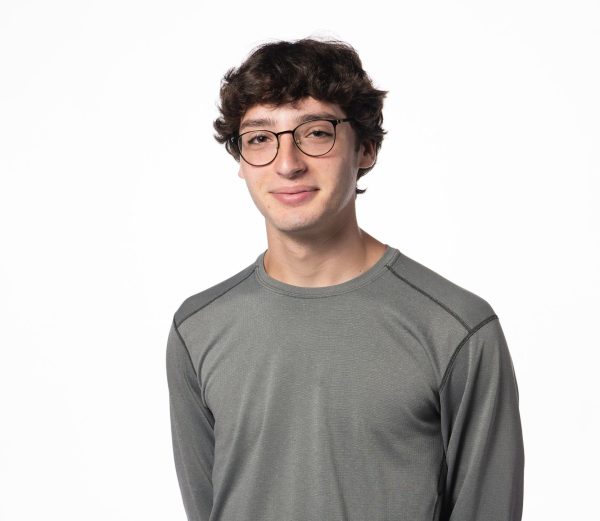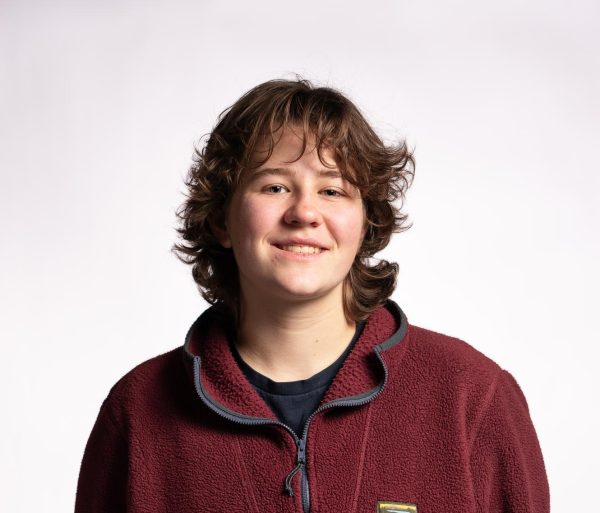Some know him by his incredible depth of knowledge regarding the American government system. Maybe he’s known by his signature blue Oxford shirt and tie. Several people recognize the “snarky and subtle” humor he slips in during a lesson or conversation. Others recognize him as their lieutenant, colonel or even an esquire. Most teachers spend their mid and late 20s getting their education degrees, figuring out where they want to live their lives, what school they’d like to settle down in and planning out a nice trajectory for their future. However, this feat is not one that Ladue social studies teacher, lawyer and Lieutenant Colonel Robert Snidman chose to embark upon.
Contrary to the typical Ladue upbringing, Snidman began his childhood in Los Angeles. Through high school, he attended a Los Angeles City public school.
“The classes were huge,” Snidman said. “It was dangerous. There were certain areas around the schools that were off-limits and were occupied by gangs. I had no place to go.”
Due to the city of Los Angeles’ limited resources, after completing high school graduation requirements, students were unable to take any more classes. If they desired further education before graduation, they were required to attend a local community college or an honors program at University of California Los Angeles, where Snidman would eventually graduate in 1986.
“That’s why I’m just horrified by senior privilege,” Snidman said. “It’s a privilege to be able to take all the classes you want.”
During a year abroad in college, Snidman lived in Kibbutz Hanita, Israel. A kibbutz is an agricultural community based in Israel. This kibbutz in particular had a large banana plantation where Snidman spent most of his time farming bananas. He would be up at 4 a.m. with his machete loading bananas into the back of a flatbed.
“There were some great people there and it was an adventure,” Snidman said. “I recommend [that] all students spend a year abroad somewhere when they’re in college.”
Snidman also spent five and a half years on active duty in the United States Air Force and 16 years in the military reserves. This would take him to Japan, Hawaii, Singapore and many other countries in the Eastern hemisphere. Snidman encourages young people to join the military.
“It was a great experience on so many levels,” Snidman said. “The pay is really good and the benefits are really good. In movies, everyone is always screaming at you and treating you poorly. It wasn’t like that at all. Work is always interesting and the people you’re working with are usually sincere, hard-working people. That’s what drew me back to the reserves and since [then] I’ve missed it.”
In Japan, Snidman would spend the majority of his time on the Yokota Japanese Air Force Base as a lawyer. The base had thousands of people living on it, including families, schools and a family “court” of which Snidman was the head attorney. The majority of his cases dealt with families who were having issues with their children.
“The families of these kids who are having problems became very interesting to me,” Snidman said. “It seemed like there’s ways to try to avoid trouble or ways to address trouble which are helpful and productive and it got me very interested in education.”
After returning to St. Louis, Snidman taught at Hazelwood Central High School. He taught social studies, government and coached their mock trial team. After finishing there, he took an interview at Ladue, in which social studies teacher Christopher Saxton made an appearance.
“He stood out as a wonderful candidate and he’s got an amazing personality,” Saxton said. “He has a great ability of putting students first.”
After receiving the job, Snidman began teaching at Ladue in 2005. After retired Ladue social studies teacher David Sonius left the department, Snidman assumed Sonius’ role of the primary AP U.S. Government and Politics teacher.
“[Snidman’s] depth of knowledge is amazing,” Saxton said. “He really brings a lot of life experiences into [class], especially because he was a lawyer. You can’t get a better guy who knows the law than Mr. Snidman.”
Contrary to the typical modern classroom, Snidman keeps his use of laptops and screens to a minimum. Senior Aditya Jain is currently taking AP Government and and prefers this way for a social studies class.
“It’s interesting because he doesn’t use computers or technology,” Jain said. “He uses paper, but I find that sticking to the old-fashioned methods allows for learning in a very unique fashion.”
A tradition that Snidman adopted when he began teaching at Ladue was the ‘professional dress’ tradition started by Sonius. Students could choose to dress formally by either wearing a button-down with a tie and slacks, or a formal skirt. For every day if students dressed like this, they earned a half point of extra credit.
“It seemed to be a great program,” Snidman said. “A lot of parents told me that they were very appreciative. A kid [who] normally dressed like a slob, now would want this half point extra credit so they’re very interested in dressing professionally. I got so much positive feedback. It was something I could see [that] made students feel good about themselves and feel confident.”
However, last year the tradition ended with an order given from the board office without any explanation. Next year, the tradition would have been going for 20 years. While the professional dress tradition has ended, Snidman developed a part of the curriculum that is not seen in most classes. His AP Government students make presentations that reflect their current reading in the government textbook through the lens of current events.
“In the beginning of every class, he does student presentations,” Jain said. I like these a lot because it allows me to see [what] the other people in my class see about politics and how they view the world. It’s actually my favorite part of class.”
In the Missouri government curriculum, students are required to pass a government and Constitution test. While the exam is required to pass, students find indefinite value in the course itself.
“The U.S. has been fortunate to have a [stable democracy] for a while,” Jain said. “It’s important to understand and recognize [that] as people we have the duty to keep that going forward.”
After Snidman retires, he wants to take yoga classes, spend more time with his children, travel and adopt a new dog. He also plans to run for school board to continue improving Ladue classrooms. Snidman wants to increase teacher pay, decrease class sizes and provide more support for the Ladue faculty and students.
“My plan in December is to run for school board, so I can still be a part of this great organization that inspires me,” Snidman said. “I don’t know why classes are consistently expanding in size and that’s disappointing as an educator [and] a taxpayer. I think [teachers] could use more support and much better pay than they are receiving. There will be a voice on the school board that has a good understanding of ways to support them.”
As Snidman finishes out his final weeks, he reflects on wisdom he’s gained through valuable lessons he has learned through his teaching career.
“If everyone knew all the answers, we’re all wasting our time here,” Snidman said. “As long as people don’t know stuff, we’re progressing. Be flexible, be understanding [and] listen.”



![Teacher Robert Snidman grades papers after school. Prior to teaching at Ladue, Snidman faced unexpected adversity at Hazelwood. “[There was] open drug dealing in the bathrooms and in the back of classrooms," Snidman said. "I did my best for five years."](https://laduepublications.com/wp-content/uploads/2024/04/RobertSnidman.jpg)


![School resource officer Rick Ramirez sits in his office. He usually spends little time in his office throughout his day of work, focusing on other issues. “Where our students are, I try to be,” Ramirez said. “Sometimes I get off at 2:45 p.m. when nothing’s going on, or sometimes I get off at 10 p.m. [Those are] my hours.”](https://laduepublications.com/wp-content/uploads/2024/12/Hsiao_20241203_ID_RickRamirez_007-799x1200.jpg)

![Reva poses in front of her home and address plaque. After reuniting with her father and grandparents, she has made many new memories and retained her culture. “We have a lot of Indian cooking going on,” Reva said. “I also like telling people about Indian food, mainly because that’s something that really connects me to [Mumbai].”](https://laduepublications.com/wp-content/uploads/2024/12/At-Home-1200x799.jpg)



John Sena Akoto • May 12, 2024 at 12:29 pm
So proud of the impact that Mr Snidman left on the students of Ladue! I am certain of his similar success when he’s elected to the school board.
Hannah Snidman • May 12, 2024 at 12:25 pm
Very informative and insightful!
Robert Snidman • May 11, 2024 at 9:34 am
Great article! Thanks!